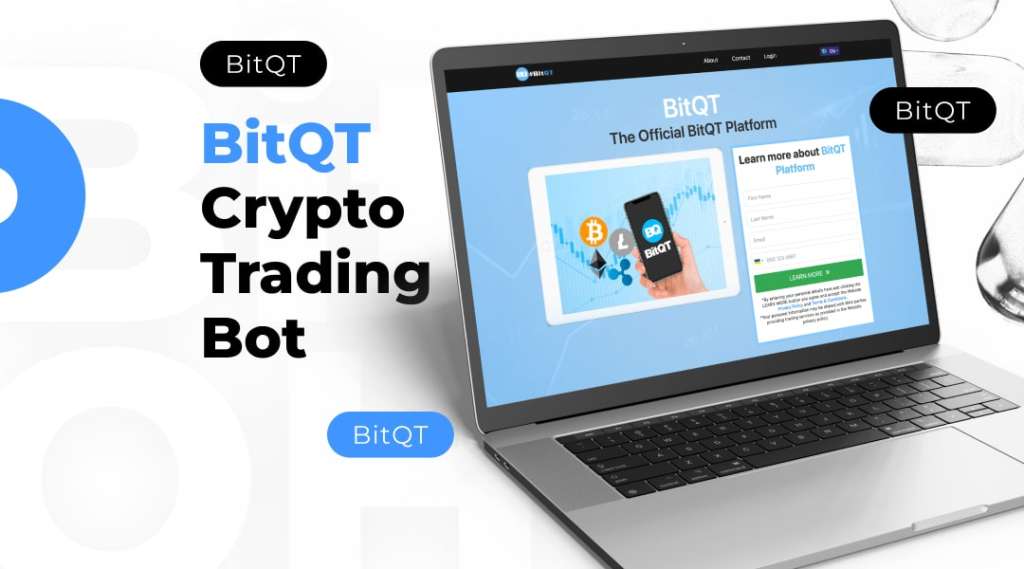
Highlights
Pros&Cons
Pros
- A wide variety of cryptocurrencies supported
- BitQT trading interface is quite user-friendly
- A low minimum deposit of 250 dollars
- Mobile app
Cons
- No 24/7 customer support and it is not possible to contact anyone from the team via phone
- The people behind the project are still unknown
- Fake reviews on review websites
- Withdrawals are impossible to make
Key takeways
- Does not store digital assets, but works with safe and relevant BitQT partner brokers to make BitQT safe, while all of these underlying brokers are licensed and regulated.
- BitQT has been featured on IndexUniverse, a known fraudulent website with fake reviews.
- Warnings about possible scams and bad reviews describe the same experiences typical of this scam.
- There is no cryptocurrency trading on the website, no trading program, and no money will ever be earned using their tool - it is just brokers catching deposits.
Overview
Table of Contents
BitQT full review
The cryptocurrency market is rising at a steady pace. However, not everyone who wants to jump on the crypto bandwagon actually has the time to keep up with trading charts and the latest news. That is exactly why numerous AI-backed crypto platforms have been built – to make it easier for people interested in crypto to make money from it with no to little interference.
BitQT is among these systems for trading cryptocurrencies, also known as trading bots, that are programmed to search and find the best money-making opportunities and take advantage of them on behalf of users.
Thus, the user is not required to have any previous knowledge (although some is desirable) while still being able to generate decent profits in digital currencies by using one of the auto trading platforms.
In today’s BitQT app review, we’re explaining if this trading robot can really deliver what is promised or if it is just another scammy website out there and what evidence we have that proves or rebuts this claim.
What Is BitQT Exactly?
BitQT is a crypto trading robot that uses artificial intelligence to perform different sets of actions and find profitable trades for the user.
The complex algorithm applies sophisticated technical analysis as well as fundamental analysis and enters positions based on the current market situation. That means that it is capable of generating profits out of whatever the situation on the market is – whether it is in an uptrend or a downtrend.
Although it is aimed at inexperienced traders in the first place, crypto enthusiasts of all experience levels, even expert traders, possibly can make a bank by using the BitQT platform.
Moreover, the demo mode allows you to practice trading with no need to invest real money, by entering several positions to see how does it look like to trade Bitcoin and other cryptocurrencies (provided you have no idea of how this whole trading thing works).
However, quite suspiciously, there are absolutely no advanced features, such as leveraged trading or CFD traders.
The BitQT trading platform claimed success rate is 99.4%, which is quite promising and tempting, but, is it realistic?
Similar success rate offer other crypto bots, we reviewed before:
How to use BitQT
As we already mentioned, almost no prior knowledge nor users’ own research is needed for Bitcoin trading with BitQT.
This auto trading robot does the hard work for you and enters and exits positions whilst keeping track of the charts and patterns that indicate price movements to either upside or downside.
Once you put online trading on autopilot, you can keep an eye on the trades and profits but that’s basically it, no other actions are required from your side.
How to Create a BitQT Account
Registration
Making a Deposit
Begin Trading
Yet, does it find them for real? We’ll hop onto that in a second. Let’s just go through the main features of this allegedly user-friendly platform first.
BitQT – Key Features
Deep Learning
BitQT uses advanced techniques and methodologies to make money, AI, DL, and NLP in the first place.
It distinguishes between legitimate and fake news that can affect the crypto market and performs extensive research in the form of numerous analyses of market trends before entering trades.
Market analysis is conducted in a matter of seconds and trades are opened within a split of a second, too, to make sure no opportunity is missed.
Advanced Trading Techniques
The BitQT robot calculates the profitability rate per trade and is capable of taking advantage of the ever-changing market when it executes trades. The supposed profitability rate is rather high. The main reason for this is that it applies advanced trading strategies, scalping and short-selling as well as high-frequency trading.
HFT is a popular trading strategy that involves entering many trades in a short period of time and exiting each when at least some profit is achieved.
Security
The crypto space has become less secure than it was a year ago. Many people were hacked and their wallets got drained. For investor protection from hackers, the BitQT platform supposedly follows strict regulatory trades.
It doesn’t store digital assets themselves, but works with secure and relevant BitQT partner brokers to make BitQT safe. These underlying brokers are all regulated brokers that are the best in business.
No Down Times
If you are among experienced traders, you already know that exchanges and trading websites can oftentimes be down. This stands on your way of making profits since, in the crypto world, opportunities to make money emerge within minutes, and, not being able to enter trades when you want to simply – sucks.
Well, with the BitQT trading app, you can trade whenever you want and constantly generate daily profits, since no glitches or downtimes have been reported so far.
Which Currencies Does BitQT Support?
BitQT operates with 14 cryptocurrencies, which is a quite decent number.
You can trade Bitcoin, Ethereum, Bitcoin Cash, Litecoin, Ripple, and Binance Coin just to name a few, and it’s always nice having options, right?
BitQT – Earning Potentials
As already know, BitQT features auto trading, which means that the trading bot performs trades on its own and doesn’t require your intervention.
Users are supposed to get the same chances once they deposit their funds, even if they start with low amounts. Once you give it a heads up, the bot starts a live trading session or, more often, multiple sessions at a time.
The robot claims that you can earn somewhere around $800 each day, even if you start with $250. Needless to say, the platform also claims that users who cash in more money can increase their earning potential, big time.
There are some speculations that some investors are making $25,000 a day, although, you’ll agree, it is a bit hard to believe this.
Although you can’t see this if you visit the BitQT website now, we have seen something like a profit calculator on their official page sometime before.
The calculator would display your earnings depending on the initial amount of money you invest and the time of usage (one day to 30 days). However, for some reason, this calculator had been removed from the website.
BitQT Fees
BitQT is one of a few trading platforms that doesn’t charge any transaction fees – you get a free account, no monthly charges, additional charges, or hidden fees.
However, there’s a small catch. You still have to give away some of your earnings with the platform since they claim that they charge a 2% commission on all profitable accounts.
And, if their success claims were true, that means that the tool would be charging almost every user. Either way, it’s nice to know that you don’t have to split much of your earnings.
BitQT really seems like a great product that generously shares with others what they have been building for months or years. Yet, we all know what they say – if something is too good to be true…
BitQT Customer Support
Just like other platforms, BitQT displays contact information on its official page. It looks like you can contact their customer support agents via Skype or email.
Yet, there is no phone support and we couldn’t find their phone number. Having live, 24/7 support means a lot, since traders can run across, let’s say, withdrawal issues.
However, BitQT doesn’t offer 27/4 support and reaching them via phone is just impossible. Now that we have mentioned withdrawals, it takes 24 hours for withdrawal requests to be approved and, eventually, executed. You can withdraw money to either your bank account, credit, or debit card.
BitQT – Red Flags
Fraudulent platforms act differently from legitimate companies. A legitimate crypto service will want all its traffic to flow to a single point.
Sounds logical, right? You want your customers to reach you so they can get the service. And, of course, you would be trying to protect your potential customers from scams and at least warn them that someone out there is trying to impersonate you.
On the other hand, these fraudulent platforms want their product dispersed across many different website addresses because that’s the way to avoid bad reviews, and leverage fake reviews (credibility by volume of review sites).
This is also a way to trick more people in, since they wouldn’t know which website is the real one and would, probably, try their luck with maybe two of them.
The first red flag we encountered was that BitQT was featured by IndexUniverse, a well-known fraudulent fake review website. Following the link they provide, usually, you would end up at a very obscure web address, mismatching the logo and screenshots of the review.

Well, the BitQT robot does it in a slightly different way, but the marks of the fraud and red flags are still there and shouldn’t be ignored.

The next thing you should do is check out ApexOffer.net. This address has already been connected to fraudulent websites, passing off as a legit crypto trading platform. Then notice the bunch of logos. You will spot a couple of logos of companies connected to safety, like Norton.
Although there is no reason for a crypto platform to be connected to an antivirus company, they still decided to put this logo on their website (probably just because they want to appear more professional).
The same is with the bunch of financial media logos. This product is not endorsed by CNN, Financial Times, BBC World News, Forbes, or Bloomberg. Searching at each of these platforms, we find no news, articles, or endorsements.
The same marketing technique exploit a number of other scam crypto bots we have been warning about:
The next thing we see is a list of names, flags, sums, and what seems to be trading pairs.

However, this tells us nothing about the platform. I mean, I don’t want to say that there are no Nikitas in India or Emmets in Vietnam, but the names seem random and not connected to the flags they represent.
Sums seem arbitrary and tell nothing: are they profits, prices, or what?
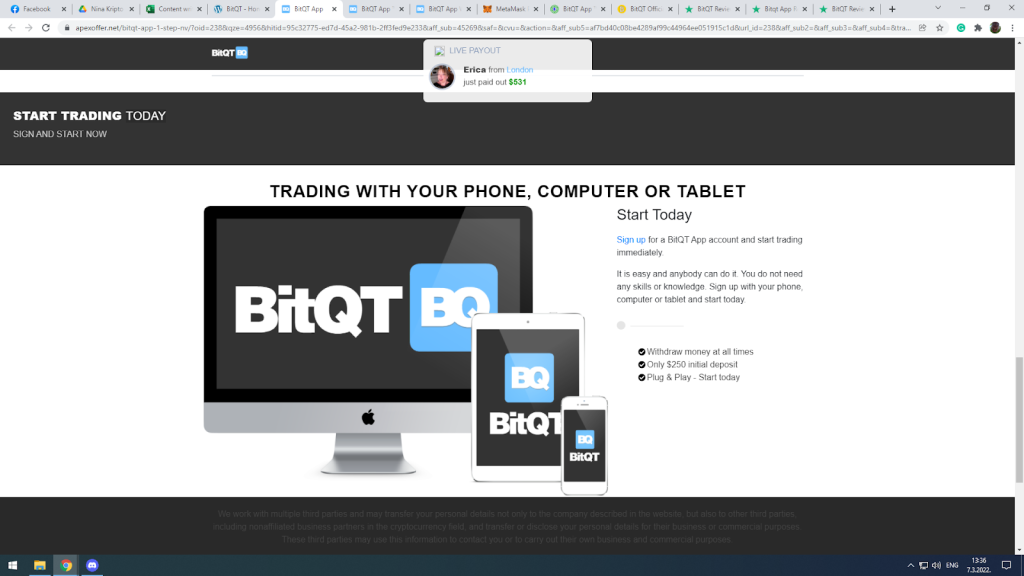
Then there is this screen. We don’t see how the trading platform actually works, there are no screenshots, just the logo.
There is that $250 deposit you should pay if you want to use the app, which is NOT how legit crypto platforms work. And the disclaimer allows the platform to sell your data to a third party.
None of this is proof of a scam, but it does raise a very big red flag. First of all, legitimate crypto trading platforms don’t require high deposits. Binance, Coinbase, KuCoin, you can start trading with as little as $10, if there is a limit at all.
Plug and play is another red flag. Legitimate crypto trading platforms will as you to register by e-mail and then, in order to deposit and trade, you would be asked to go through a strict verification process, as part of the Know Your Customer (KYC) protocol.
Legit platforms never share your data with third parties but still need your data to make sure they are not doing business with people connected to money laundering, etc.
Googling BitQT leads us to five different addresses. Mistakes and inconsistencies are the hallmarks of this type of scam, just like many others, already mentioned on this site:
Here we have the ‘wrong’ logo:
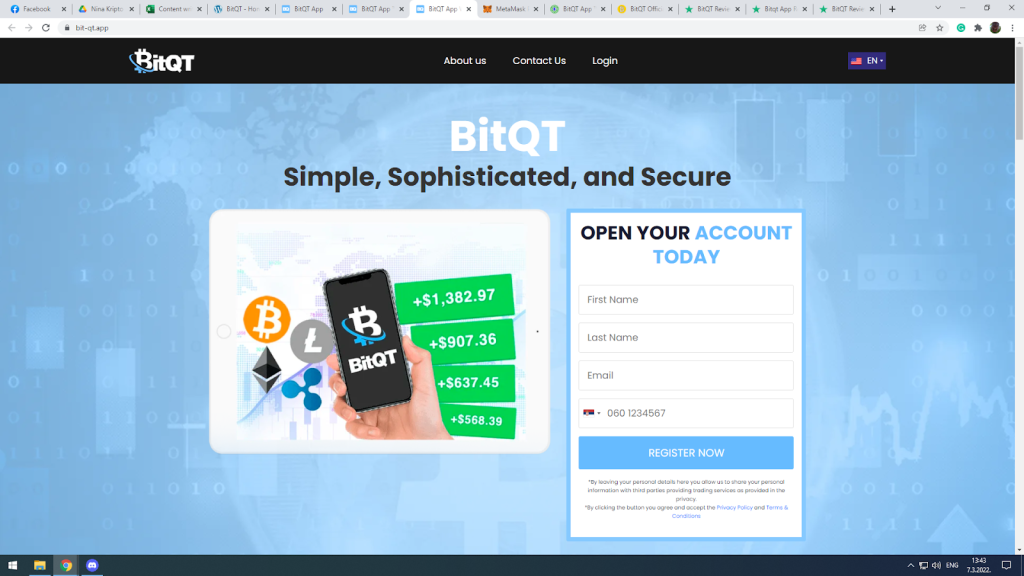
Here we have one of the addresses actually at the base of fraudulent websites:
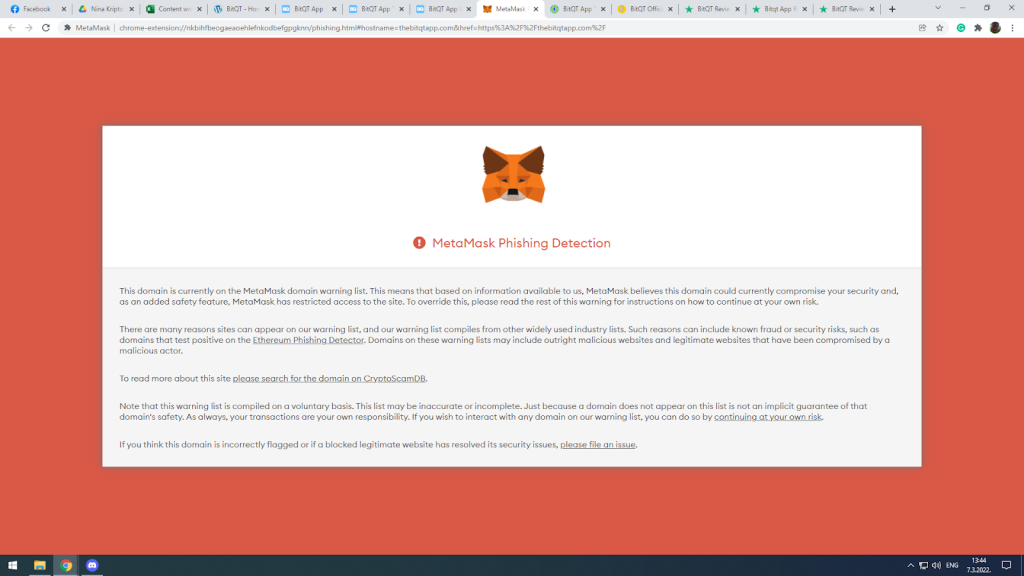
Again, the ‘wrong’ logo here:

Then we stumble upon one of the versions using an old layout connected with a bunch of different sites, known for being fraudulent platforms.

Again, this product is NOT seen on CNN, Financial Times, Time, or Forbes, nor has any celebrity mentioned it anywhere. Typical red band counting down to foster customers’ fear of missing out (FOMO), with random fake names and pictures claiming to have just made some money.
Trustpilot Reviews of BitQT
Then we head out to the Trustpilot website. There, we find several BitQT versions and, of course, we learn why the scammers want to dilute their presence online by using several different web addresses.
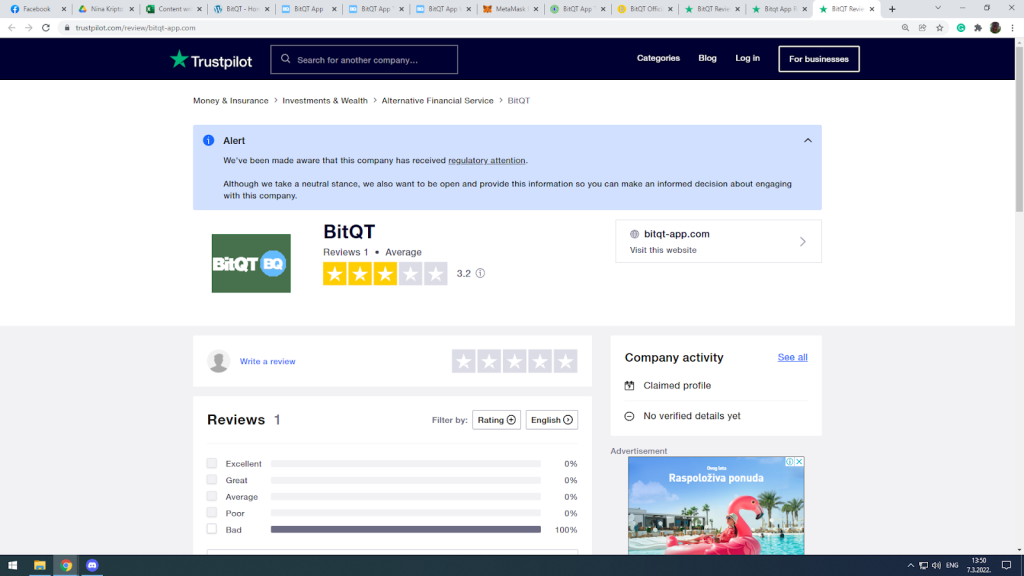
As you can see, alert warnings of possible fraud and bad reviews describe exactly the same experience typical for this scam. Someone who, unfortunately, got scammed by interacting with the bot was trying to warn other people not to trust BitQT with their funds.
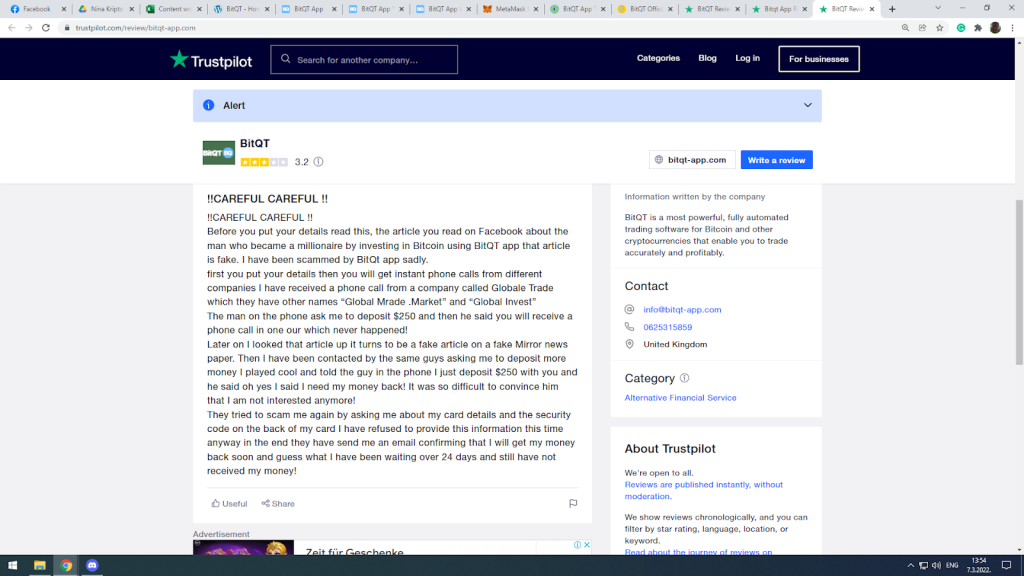
Note that this bad review is the only one, yet the number of stars is 3.2 which probably means that there were other reviews that got deleted (possibly fake reviews done by the scammers).
Scammers sometimes pay other people to leave positive comments on online review platforms, yet, Trustpilot is one of a kind, and the team behind this software knows how to recognize fake reviews and remove them.
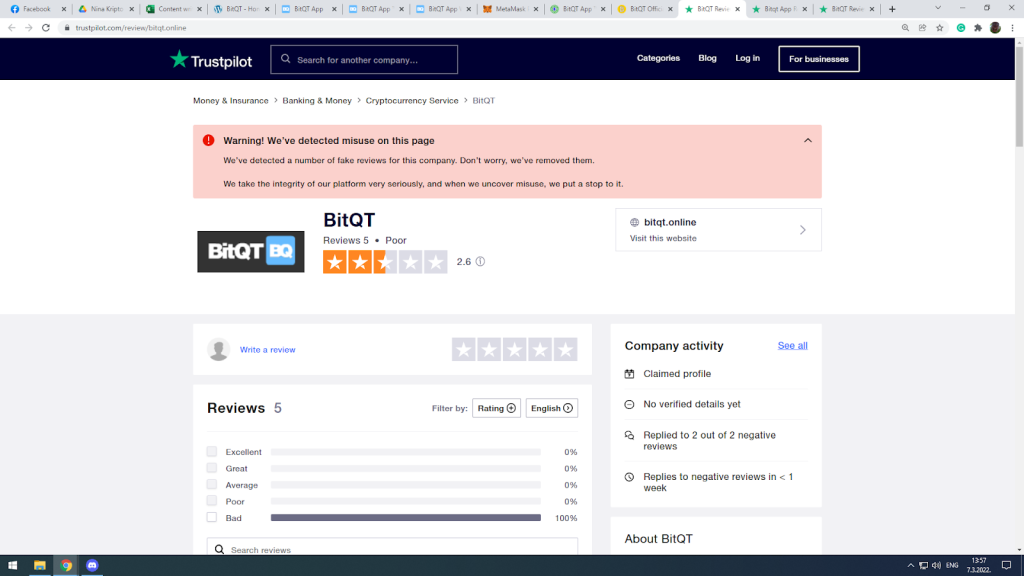
Same thing here, only with an explicit claim by Trustpilot that this version is a scam. Note the poor reviews and number of stars, again a mismatch.
How Do These Scams Operate?
There are several known practices for these fraudulent websites.
- They change names and logos to avoid being targeted by market regulators, legit review sites, and agencies (like Trustpilot).
- They ask for a $250 deposit. Many legitimate automatic trading software do have minimum investments, but these measure in low figures, typically $10, while some of these don’t even set the minimum deposit.
- They ask for a phone number as part of the registration. Legit crypto services have several layers of identification. The typical platform will ask for an email, then proceed with different Know Your Customer verification protocols (scan of ID or other national ID documents). These fraudulent websites usually claim speedy registration with just phone and email. BitQT registration involves sharing your email and a screenshot of a utility bill but they never ask users to show their IDs.
- They all have disclaimers that make the customer agree with the breach of their privacy. Namely, they make it legitimate for the agents or ‘brokers’ of the fraudulent sites to call the customer (typically they will contact the gullible via WhatsApp).
- Brokers aggressively pursue customers to deposit the first $250 and then it becomes impossible to get your money back. There are no profits. Another reason to change names and website addresses. Once the number of angry customers mounts up, scammers simply move to greener pastures, abandoning their project.
Final Verdict
As we have demonstrated in our BitQT review, this alleged auto trading platform definitely a scam! Do not fall for it.
FAQ on BitQT
It’s a fake website for automatically trading Bitcoin. They want your data so that agents can call you and ask for a deposit of $250 and promise a great return on investment.
The fact is, there are no cryptocurrencies traded on the website, no trading program, and no money is ever going to be made with their tool, it’s just brokers fishing for deposits.
Yes. It is part of a series of fraudulent websites, a total scam. As soon as they begin trading, users will realize that they’re losing money rapidly. What’s worse, these con artists don’t seem to care that someone might actually lose his or her life savings to their scam. A very slimy operation, indeed.
Judging by reviews, you can’t profit when trading with BitQT. You can only lose a $250 deposit. Although it may look like the BitQT system has a high success rate and is risk free, the truth is far from that.
You will be promised thousands of dollars in profits within just a day and expert investment advice. However, the bot will only use (and lose) all of your money, so you won’t be able to get your investment back.
No. This is a scam. There are legit warnings in the disclaimer, however, that your capital is at risk. By registering, you agree to have your data sold or transferred to third parties. You agree to be contacted by agents (to bug you for the deposit).
So, basically, since you are warned about all this at the beginning, you won’t be able to sue the platform or the people behind it for tricking you into investing your money.
After all, you yourself should be well aware that crypto trading carries risks and double-check which websites you give your personal information to.
There is no way that BitQT would give you back your money because they work with third parties and broker partners that actually keep the funds. Yet, do not give up still, because there may still be a chance of getting those funds back.
Do your research and find out which broker BitQT connected you to. Contact the broker and tell them that you want to request a refund. Explain the entire situation and mention that you have fallen victim to the BitQT scam. There might be a chance that the broker won’t respond, which is why you should mention that you would raise a complaint with the financial regulators.
Alternatively, contact someone from your bank and request a chargeback (provided that you have used a payment card). Note that it will be a bit hard to reverse a bank transfer but you should still try.
If you use Wire Transfer or PayPal, contact them via email, explain that you were scammed, and hope for the best. Finally, if nothing helps, you can try with financial regulators in your country or the ones in the country where your broker had registered their office.
Reviews
After depositing money into my account, I quickly realized that the software was a scam. It made terrible trades and lost me a lot of money. When I tried to withdraw my funds, I was met with radio silence from customer service. I highly recommend avoiding BitQT at all costs.
I’d like to warn everyone to be very careful with these bots. It can be easy to confuse bitqT with bitqS or bitqL. I accidentally invested $250 in the T, and to no surprise it’s went down the drain..
Can confirm it’s a scam. I got burned, have been extra careful since to do proper research





